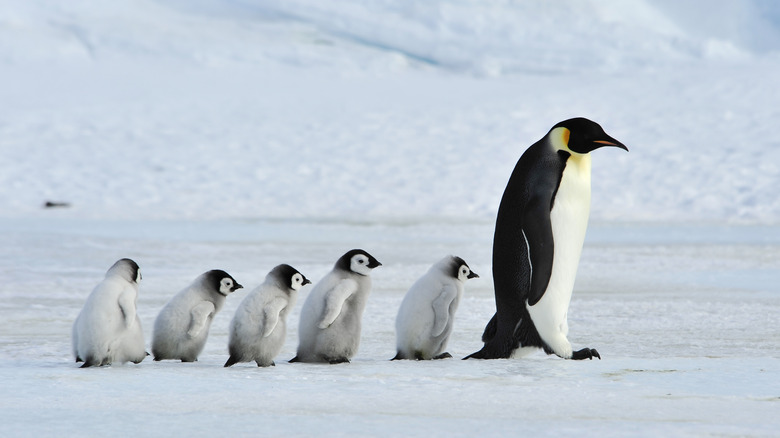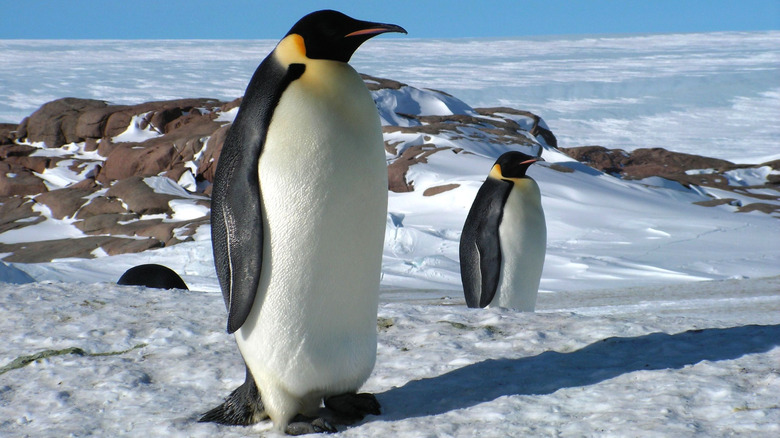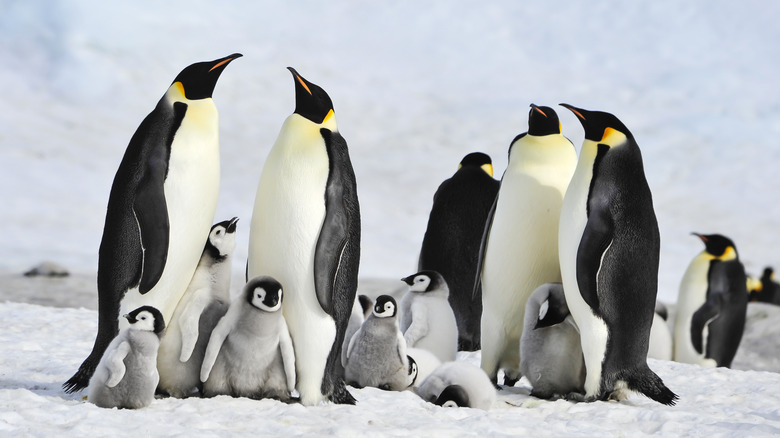The Antarctic Penguin Colony That Was First Discovered From Space
There's something about penguins that we seem to find endlessly endearing. They appear on all manner of holiday cards. They're brought to life in beloved movies like "Happy Feet." At zoos and parks around the world, they're one of the main animal attractions.
As a species, we seem to have anthropomorphically assigned a fun-loving, mischievous side to penguins. That surely plays a part in their appeal, as does the fact that they're creatures of two halves. They hop and lumber about in a rather silly fashion on land, but in the water they're elegant and remarkably fast swimmers. In fact, Penguins International reports that the gentoo penguin is the speediest species of all birds when it comes to swimming.
It's not about cuteness or silliness, however. Penguins are important to the ecosystems in which they find themselves, and it's important for their numbers to be monitored to determine the state of that ecosystem. The good news, in that regard, is that a previously-unknown colony of one species was discovered from space.
Huddling in big, noticable-from-space groups
The Antarctic, as was drummed into millions of heads from an early age, is home to penguins, while the Arctic is home to polar bears. The other rudimentary fact to know about the Antarctic is that it's very, very cold indeed. The director of the British Antarctic Survey, Professor Dame Jane Francis, made this abundantly clear. "In the Antarctic winter ... when there are no staff on the station, it is dark for 24 hours and the temperature falls below minus 50 degrees C (or -58F)," Francis said in January of 2023.
The outlet explained that workers are present at its scientific facilities only during the summer, because conditions are absolutely unimaginable during the coldest time of the year in the region. How do the penguins that call Antarctica home bear it? Through various adaptations, including the tried-and-true huddling approach. As BBC Earth explains (via BBC Earth on YouTube), "heat is a thermal energy that's constantly flowing around us ... as it flows, it naturally moves from hotter objects to colder objects."
The iconic emperor penguins are just one species that huddle in enormous groups to keep warm. As a Nature on PBS clip on YouTube puts it, "their chicks are born in the depths of the Antarctic winter ... as temperatures reach 40 below, even the adults' only chance of survival is to huddle together."
The poop of a previously unknown colony of emperor penguins, it seems, was noticed purely by chance via satellite.
What does the future hold for emperor penguins?
LiveScience reports that the British Antarctic Survey was observing the condition of the ice in a large region, through satellites (some of that handy remote work that can be done to avoid the frigid temperatures in the region). Per The European Space Agency, two Sentinel-2 satellites provide regular, fantastic views of the region, and LiveScience adds that Peter Fretwell of the British Antarctic Survey was looking through these very eyes on the Antarctic in December 2022 when he saw something unexpected: a patch of brown that turned out to be a quantity of penguin poop.
From there, the outlet went on, better quality images from two months prior were consulted. These images, reportedly, were taken by the WorldView-3 satellite, which The European Space Agency reports captures "three million square km per day of global imagery." What did it capture in this particular instance? A sizable group of emperor penguins, which appears to consist of about 500 penguin families.
The WWF's polar program manager, Rod Downie, said of this glorious bird, "No other species is so perfectly adapted to survive in the most extreme and remote place on earth. They inspire me." While it's encouraging to see a surprising boost in numbers such as this 'hidden' colony, it's a sad fact that the future of emperor penguins, and of their frigid home, remains in doubt.


